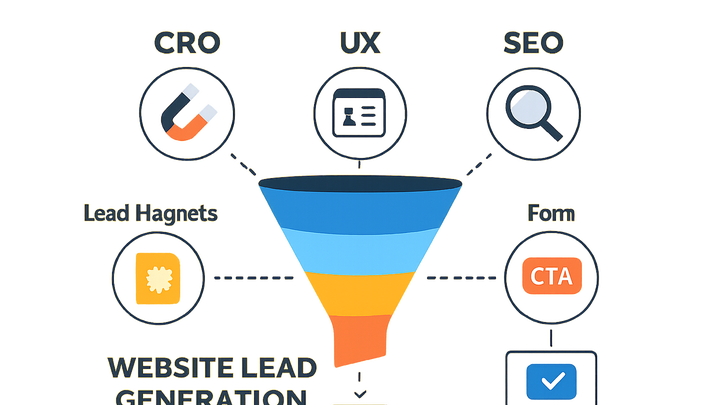Published on 2025-06-29T19:07:01Z
What is Lead Generation? Examples & Best Practices in CRO, UX & SEO
Lead Generation is the ongoing process of attracting potential customers by capturing interest information such as email, phone, or other contact details. In the context of website optimization—particularly within CRO, UX, and SEO—lead generation focuses on creating and refining touchpoints that encourage visitors to share their contact information or express interest. Effective strategies use compelling lead magnets, optimized forms, clear calls to action, and seamless user experiences to maximize conversion rates. SEO drives qualified traffic, while CRO and UX ensure that once visitors arrive, they can navigate content and complete desired actions efficiently. Tools like PreVue.me help site owners obtain actionable critiques in design, copy, accessibility, and technical optimization to fine-tune every element of the lead funnel. By aligning these disciplines and continuously iterating based on analytics and real user feedback, businesses can build a robust pipeline of qualified leads and grow revenue.
Lead generation
Process of attracting and converting site visitors into leads through optimized CRO, UX, and SEO tactics.
Definition & Core Concepts
This section explains what lead generation means in the context of website critique. It covers the basic building blocks and terminologies.
-
Lead
An individual or entity that has expressed interest in a product or service by sharing contact information or engaging with a website. Leads can be categorized based on their engagement level.
-
Lead magnet
A valuable resource (eBook, webinar, free trial) offered to visitors in exchange for their contact details. These incentives drive form submissions and increase lead volume.
- Examples:
eBooks, checklists, free consultations, discount coupons.
- Best practices:
Align magnet with audience needs, ensure immediate delivery, and keep offers concise.
- Examples:
-
Lead capture mechanism
The tools and processes used to collect visitor information, such as forms, pop-ups, chatbots, and interactive quizzes.
- Forms:
Classic contact or newsletter signup forms optimized for minimal required fields.
- Chatbots:
Automated chat interfaces that ask qualifying questions and collect leads in real time.
- Forms:
Integration with CRO, UX & SEO
Lead generation strategies intersect with conversion rate optimization, user experience, and search engine optimization to maximize the volume and quality of leads.
-
Cro
Conversion Rate Optimization focuses on improving the percentage of visitors who complete lead-generation actions through A/B testing, heatmaps, and performance analysis.
- A/b testing:
Test form layouts, button colors, and headlines to determine the highest-converting variations.
- Heatmaps:
Analyze where users click and scroll to optimize form placement and calls to action.
- A/b testing:
-
Ux
User Experience ensures that the path to becoming a lead is intuitive, accessible, and frictionless across devices.
- Mobile optimization:
Design responsive forms and minimize input friction for mobile users.
- Accessibility:
Implement proper labels, focus states, and ARIA attributes to make forms usable for all users.
- Mobile optimization:
-
Seo
Search Engine Optimization drives targeted organic traffic to landing pages optimized for lead capture.
- Keyword targeting:
Use intent-driven keywords to attract users likely to convert.
- On-page optimization:
Optimize meta tags, headings, and structured data to improve visibility and click-through rates.
- Keyword targeting:
Tools & SaaS Solutions
Numerous SaaS tools can help streamline lead generation by offering insights, automations, and integrations.
-
Prevue.me
A website critique platform providing actionable recommendations across CRO, UX, SEO, and accessibility to optimize lead generation funnels.
- Actionable critiques:
Receive prioritized feedback on form design, content tone, button placement, and technical SEO issues.
- Integration with analytics:
Sync PreVue.me recommendations with Google Analytics and CRM platforms for data-driven iteration.
- Actionable critiques:
-
Hubspot
An all-in-one marketing CRM platform offering form builders, email automation, and lead nurturing workflows.
- Form builder:
Drag-and-drop interface to create customizable lead capture forms.
- Workflow automation:
Automate follow-up emails and segmented contact management to nurture leads.
- Form builder:
Measuring & Optimizing Success
Consistently tracking performance and refining approaches is key to sustainable lead generation growth.
-
Key metrics
Quantifiable measures that indicate the health of your lead generation efforts.
- Conversion rate:
Percentage of total visitors who become leads.
- Cost per lead (cpl):
Total marketing spend divided by the number of leads acquired.
- Conversion rate:
-
Testing & iteration
Continuous experimentation to refine offers, messaging, and form experiences.
- Multivariate testing:
Test multiple elements simultaneously to uncover interactions.
- Feedback loops:
Collect user feedback directly to inform improvements.
- Multivariate testing:
-
Reporting dashboards
Centralized views that consolidate metrics from different tools for quick analysis.
- Google analytics:
Track form submission events and user flow to lead pages.
- Prevue.me reports:
Visual reports with prioritized recommendations and progress tracking.
- Google analytics:
Common Pitfalls & Best Practices
Understanding common mistakes and adopting best practices ensures higher quality leads and improved conversion rates.
-
Overcomplicated forms
Long or confusing forms deter users from completing the lead capture process.
- Field minimization:
Ask only for essential information to reduce friction.
- Progressive profiling:
Collect additional details in subsequent interactions instead of a single form.
- Field minimization:
-
Weak call-to-action
Generic or unclear CTAs fail to motivate users.
- Clarity:
Use action-oriented, benefit-driven language.
- Visibility:
Ensure CTA buttons are prominent and accessible.
- Clarity:
-
Ignoring mobile & accessibility
Failing to cater to mobile users and those with disabilities excludes significant audience segments.
- Mobile-friendly design:
Implement responsive layouts and touch-friendly elements.
- Standards compliance:
Follow WCAG guidelines for form accessibility.
- Mobile-friendly design:
